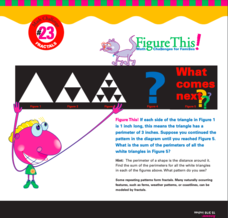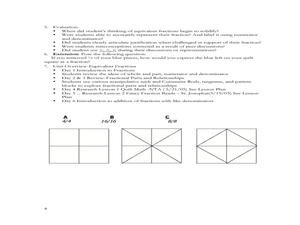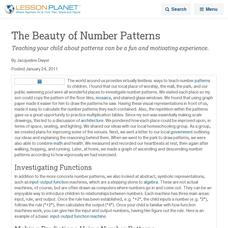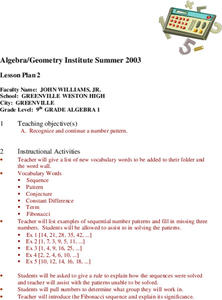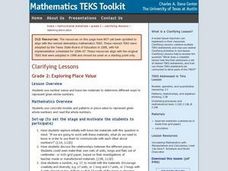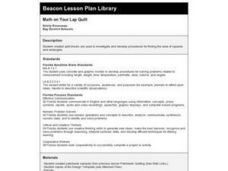Curated OER
Problem Solving: Number Patterns
In this number patterns activity, students use the patterns of numbers within each word problem to solve and answer the six word problems.
West Contra Costa Unified School District
Discovering Zero and Negative Exponents
Need a hand with an Algebra II integer exponent activity? This versatile worksheet can be utilized as a activity to supplement instruction. It derives the idea of a negative exponent before practicing a variety of questions.
Education Closet
Equal Rhythms
Engage young mathematicians in learning about fractions with this cross-curricular math and music lesson. After listening to and repeating different beat patterns, children realize that musical notes are just another way of representing...
Mathematics Assessment Project
Generalizing Patterns: The Difference of Two Squares
After completing an assessment task where they express numbers as the difference of squares (i.e., 9 = 5^2 – 4^2), class members note any patterns that they see in the problems.
National Council of Teachers of Mathematics
Math Challenge #23: Fractals
Young scholars explore the concepts of Sierpinski's triangle, ratios, and concentrations. In this exploratory lesson, students are given three problems to solve. Young scholars learn about Sierpinski's triangle, how to calculate mpg for...
Alabama Learning Exchange
Pattern and Practice
Young scholars learn how to make patterns. Students first display their prior knowledge of patterns before delving into the lesson. They complete a worksheet and participate in a web-based class activity. They work in cooperative groups...
Curated OER
How to Use the Rules of Divisibility and Estimation
Number patterns help your kids learn divisibility and estimation rules. This activity aims to strengthen their math fact memorization skills by presenting several rules they are expected to memorize through practice.
Curated OER
Half Math Quilt
Help your third graders become familiar with equivalent fractions for one-half by having them create a quilt. They will use triangles to create a quilt of equivalent fractions over a period of 6 days. As they create the quilt pieces they...
Curated OER
Guess That Sequence!
Students explore number sense by completing problems in class. In this patterns lesson plan, students examine a group of numbers and identify what the pattern is and how it should correctly continue. Students practice utilizing number...
K20 LEARN
Didn’t We Already Learn That Pattern? Functions/Arithmetic Sequences
Just how many toothpicks does the pattern take? After watching a video of someone building a pattern with toothpicks, groups create methods to find the number of toothpicks needed to accomplish that task. Groups either use explicit...
Curated OER
The Beauty of Number Patterns
Teaching your child about patterns can be a fun and motivating experience.
Curated OER
2, 4, 6, 8 . . .What Do We Appreciate-Patterns, Patterns, Patterns
Students discover and predict patterns in a numerical sequence. Through the Internet and video segments, students begin with basic number patterns and extend their knowledge into higher math skills. They will also create new patterns...
Curated OER
Patterns and Sequences
Ninth graders examine sequential number patterns and the Fibonacci sequence. Given number patterns, they determine the next number in a sequence. Students develop their own number patterns and exchange them with another to be solved.
Curated OER
Number: Index Notation
Students explore the concept of index notation. In this square root and cube root lesson, students examine number patterns as they complete a worksheet that requires them to calculate roots.
Scholastic
Adding and Subtracting Ten
Developing fluency with basic addition and subtraction is fundamental to the success of all young mathematicians. This four-day lesson series begins with learners using ten-frames and hundreds charts to recognize patterns when adding and...
Curated OER
Grade 2: Exploring Place Value
Creative problem solving is fun and helps kids conceptualize content. They use grid paper, manilla paper, and markers to cut, draw, and show given double-digit numbers as many ways as they can.
Public Schools of North Carolina
Math Stars: A Problem-Solving Newsletter Grade 1
Keep the skills of your young mathematicians up-to-date with this series of newsletter worksheets. Offering a wide array of basic arithmetic, geometry, and problem solving exercises, this resource is a great way to develop the critical...
Curated OER
Arithmetic Patterns
Introduce your young math scholars to functions. Because the answer is explained at the bottom of the page, consider projecting this and covering it up until you hear the class responses. They observe a rule (in this case to add 15) and...
Curated OER
Creating AB Patterns
Students work with patterns. In this pattern lesson, students find AB patterns in nature and the manmade world. They create their own AB pattern using math manipulatives and visual arts.
Curated OER
Adding Tens
Second graders explore and discuss adding 10 as they predict number patterns with the hundred chart. They work in pairs, groups choose a number, 1-9, and predict what happens if they add 10 to the number. Students make-a-ten strategy...
Curated OER
Exploring Patterns
Third graders state the rule and next shape or number in the patterns. In this patterns lesson plan, 3rd graders recognize different patterns and continue them.
Beacon Learning Center
Ten Pins
Multiplying with multiples of 10, 100, and 1,000 provides an opportunity to discuss patterns that arise with zeros. The class uses these patterns to solve problems. Then they rotate through three work stations, including a computer-based...
Curated OER
Geo Jammin' By Design - Day 7, Lesson 38: Kool Cups
Create geometric cups by interpreting directions, informational text, and mathematical concepts. Critical thinkers apply geometric theory (congruent shapes, patterns, symmetry) to actual directions to create a cup that holds Kool Aid....
Curated OER
Math On Your Lap Quilt
Get creative juices flowing when you allow groups to figure out a procedure for how to find the area of squares and rectangles. They may use the individual patchwork blocks, or they may design one using the Design Template.






